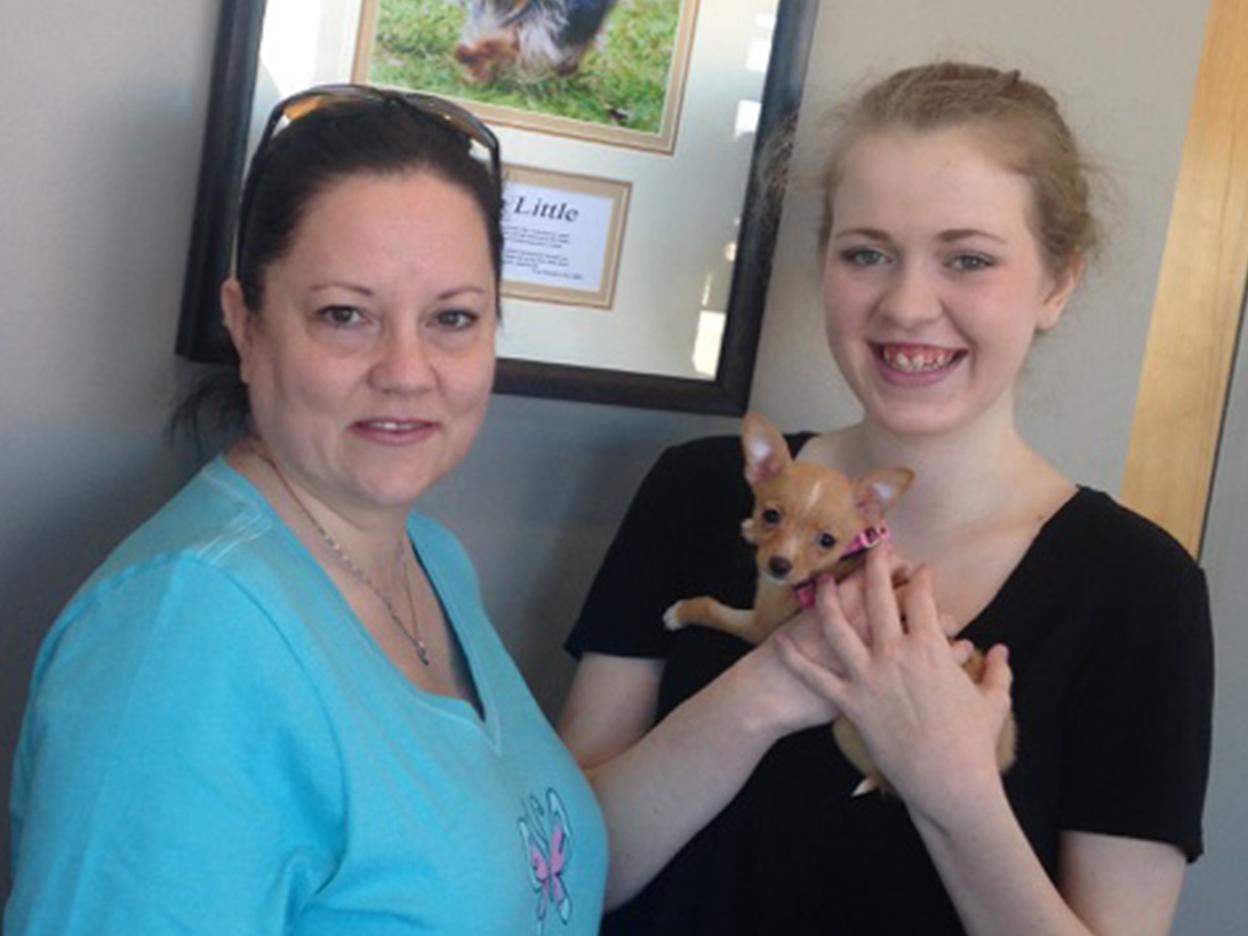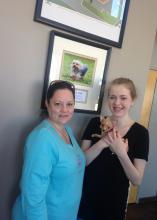Information Possibly Outdated
The information presented on this page was originally released on February 17, 2016. It may not be outdated, but please search our site for more current information. If you plan to quote or reference this information in a publication, please check with the Extension specialist or author before proceeding.
Helping sick pets: a gift from the heart
By Karen Templeton
MSU College of Veterinary Medicine
Flowood, Miss. -- Bridget Monk of Pearl has dealt with and overcome a great deal in her 16 years. But all difficulties were forgotten when her new puppy, Princess Paisley, was placed in her arms.
Bridget has undergone major surgeries and medical intervention to treat a congenital heart defect, but her family believes the most effective treatment came through the snuggles of the tiny Chihuahua-mix puppy given to her by a neighbor. Sadly, Bridget’s family soon faced further tribulation when the dog contracted a life-threatening illness.
“It was so wonderful to see Bridget with her new puppy,” said Christina Arbaugh, Bridget’s mother. “It hasn’t been the easiest of roads for Bridget, and it was nice to have Princess Paisley around to cheer her.”
But when the puppy was just 8 weeks old, she became ill and started vomiting profusely. Arbaugh worked diligently to keep the puppy comfortable and hydrated. It did not take long for the family to realize Princess Paisley needed emergency care, so they took her to the Animal Emergency and Referral Center (AERC) in Flowood.
The AERC, a unit of the Mississippi State University College of Veterinary Medicine, offers pet emergency and specialty care.
“Princess Paisley arrived to the AERC comatose, hypoglycemic, hypothermic, in addition to vomiting and having diarrhea,” said Dr. Christine Eaves, AERC emergency clinician. “She was diagnosed with parvovirus -- a very serious virus.”
Arbaugh and her family desperately wanted to have their new puppy treated immediately, but the cost of treating parvovirus is expensive. AERC veterinarians and staff members worked to get Princess Paisley into the first stage of treatment and stable.
Bridget, who had received a heart transplant as an infant, was experiencing heart artery problems that were being treated through multiple expensive medical procedures. The family has had to focus its finances on keeping her healthy.
“It was so clear that the family wanted to pay for Princess Paisley’s care and take her home,” Eaves said. “Both parents are employed and spent time trying to work out how to pay for the treatment. Even in the most ideal circumstances, parvo treatment can be a strain.”
Bridget, grieving at the thought of losing her beloved puppy, said that she would be willing to give the dog to a loving home with owners who could afford the medical treatments as long as Princess Paisley got all the care she needed.
“Bridget was putting Princess Paisley’s well-being over her desire to keep her,” Eaves said. “We got to a point in treatment where we felt confident the puppy would recover. We could have looked for a family to adopt her and pay for the treatment. But our AERC family knew where Princess Paisley really belonged.”
What Bridget and her mother did not know was that just the previous year, the Little family was in the AERC grieving the loss of Gabbie, their 12-year-old terrier. Gabbie was an AERC patient treated at the clinic for metabolic and neurological conditions, which enabled the Littles to spend more time with her.
With a desire to make quality veterinary emergency care available to others who may not be able to afford it, Christy and Bobby Little established the Gabbie Little Fund at the AERC.
“During her illness, we noticed other pet parents having to make the difficult choice to euthanize their pets because of financial situations. We were blessed to be able to spend whatever it took to try to save our Gabbie Girl, but others were not able to,” Christy Little said. “We wanted to help share that burden, if we could, for those who truly have a financial need. We wanted there to be some good come from the bad things that happened to Gabbie. We wanted her to have a legacy.”
Because of the Littles’ generosity and commitment to animal health, Eaves could offer a portion of the Gabbie Little Fund to help pay Princess Paisley’s medical bills.
“We were so surprised when this was offered to us,” Arbaugh said. “It was like a little angel came down and made everything better. I guess that was Gabbie!”
After Princess Paisley’s full recovery, she went home to Bridget and her family. And the Littles’ gift will continue to help a few families each year.
“It’s truly a gift from the heart. The Littles did something kind and meaningful with their grief,” said Jimmy Kight, director of development for the College of Veterinary Medicine. “After a loss, it is tempting to just walk away and move on, but this gift helps Gabbie’s memory continue by bringing a better quality of life to sick pets.”
Gabbie’s gift has done more than just pay for medical bills. In Princess Paisley’s case, the gift has helped improve her life so she can get back to her work of mending a young girl’s heart.
“Princess Paisley just soothes Bridget and is really just good for her heart, in more ways than one,” Arbaugh said. “I just don’t know what we’d do without the kindness of the Little family. We are so grateful.”
For more information on supporting the AERC, visit http://www.cvm.msstate.edu/aerc/support.
Contact: Karen Templeton, 662-325-1100



